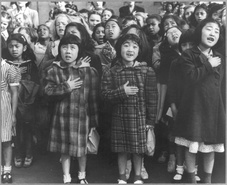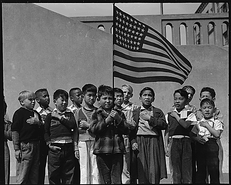When empathetic feelings turn to sympathy for the victims, it also brings about fear, anger, and hatred to the perpetrators of the evil—as well as to those who did not commit the violent act, just for having a common culture, religion, and/or racial characteristics as the perpetrators.
This kind of thing happened to us 73 years ago. Most of he Japanese living in this country were rounded up, removed from our homes, and confined in ten large internment camps. More than two thirds of the internees were Americans of Japanese descent. We were deprived of our rights and protection as citizens.
The bombing of the ships at Pearl Harbor was the spark that ignited the call for their internment. That incident triggered the pent-up hatred toward the Japanese living along the western coast of the United States. People were angry and emotionally upset after the attack—but targeting the wrong Japanese people never became an issue. We had nothing to do with starting the war or Pearl Harbor. We were its victims. There was no incidence of any violent acts or sabotage committed by these people.
JAPS KEEP MOVING. This is a White Man’s Neighborhood.
A culture of racial and ethnic discrimination existed throughout our history. Racism in this country appeared to be institutionalized for a very long time. In the past, American people initially targeted their hatred against the Native American Indians, then the Blacks, and later to the Asians as if it was the natural thing to do. Hatred toward all the Asians began 150 years ago and continues on today. Sadly, the consequence of deep hatred resulted in taking wholesale action even against those who had nothing to do with the crime.
We will never truly understand why people behave as they do. I often wondered how the roots of racism ever took hold. Was it nurtured by the abuse of power, jealousy, economic competition, or the need to maintain their cultural bias? Racism manifested itself long before the internment took place. Hatred led to racism that culminated in the internment of most of the Japanese people living here.
We don’t want any Japs back here—EVER!
None of us are immune to hatred. If you have experienced it, you know that by turning the conflict into mutual hatred does not solve the problem but only intensifies the tension. Hate begets hate. You have many non-violent methods to fight racism. You’re educated, you have the laws on your side, you know your rights, the younger generation is more supportive, and the newspapers are no longer empowered to promote it.
Hatred can grow into different forms and finds different targets. Racism is just one form. Hatred can be easily directed against other ethnic groups, people in the lower economic class, the uneducated, trans-genders, or those with a different religion or ideology.
|
These are children of mixed ethnic backgrounds pledging their allegiance to the flag…and to the republic for which it stands…with liberty and justice for all… Living by the words of the pledge creates a better world |
|
I believe the greatest enemy of hatred is the acceptance of diversity. It means that you have to treat all people fairly and justly no matter how they look or how underdeveloped they appear. Diversity will change the culture of superiority and exclusiveness. When children make contact with children of different ancestry or ethnic backgrounds while in school, or even with travel and globalization, they will find that the color of the skin or their appearances make very little difference. When the youth interact with people of diverse background, racism will be diminished and the culture of hatred will soon begin to change with the next generation. With the help of Constitutional statutes and the support from people who have moral consciousness, there is hope that their future will become better.
Does hatred make the world safer?
Do you want to change the form of our government?
Will history repeat itself?
Can human nature change?
Can we change?
These are the questions and thoughts that I like to leave with you as the NEW YEAR gets underway.
© 2015 Ben Ebihara




